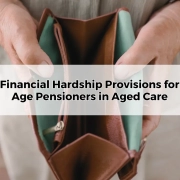Financial Advice and First-Time Planning for Aged Care
Table of Contents
ToggleIntroduction to Aged Care Planning in Australia
The Growing Need for Aged Care
Australia’s ageing population is increasing the demand for comprehensive aged care services. With longer life expectancies, planning for aged care has become more critical than ever. Understanding this need helps in recognizing the urgency and importance of proactive planning.
Early Planning Benefits
Early planning for aged care provides numerous benefits, including financial readiness, reduced stress, and better quality of life for the elderly. It allows families to make informed decisions and avoid last-minute scrambles that can lead to poor choices and higher costs.
Understanding the Aged Care System
Overview of Services Available
The Australian aged care system offers a range of services, from home-based care to residential facilities. These services cater to different levels of care needs, including personal care, nursing, and specialized dementia care. Familiarizing oneself with these services is crucial for making the right choice.
Key Terminologies Explained
Navigating the aged care system involves understanding key terminologies such as Home Care Packages, Residential Aged Care, and Respite Care. These terms define the type and level of care provided and are essential for understanding available options and making informed decisions.
Assessing Individual Needs
Health and Medical Requirements
Assessing the health and medical needs of the elderly is the first step in aged care planning. This involves understanding chronic conditions, mobility issues, and the level of medical attention required. A detailed health assessment helps in identifying suitable care options.
Personal Preferences and Lifestyle
Beyond medical needs, considering personal preferences and lifestyle choices is essential. This includes dietary preferences, social activities, and religious practices. Ensuring these preferences are met enhances the overall well-being and happiness of the elderly.
Evaluating Financial Health
Current Financial Status Assessment
A thorough evaluation of the current financial status is necessary to plan for aged care. This involves reviewing income sources, savings, assets, and liabilities. Understanding the financial landscape provides a clear picture of what is affordable and where adjustments might be needed.
Future Expense Projections
Projecting future expenses is a critical component of financial planning for aged care. It includes estimating costs for care services, medical expenses, and inflation. Accurate projections help in creating a sustainable financial plan that covers all potential needs.
Government Support and Subsidies
Overview of Available Programs
The Australian government offers various support programs and subsidies to assist with aged care costs. Programs such as the Commonwealth Home Support Programme (CHSP) and the Aged Care Pension can significantly reduce out-of-pocket expenses.
Eligibility and Application Process
Understanding the eligibility criteria and application process for these programs is vital. Each program has specific requirements and steps for application. Navigating this process efficiently ensures that eligible individuals receive the maximum possible support.
Selecting an Aged Care Facility
Types of Aged Care Facilities
There are several types of aged care facilities, including independent living units, assisted living facilities, and nursing homes. Each type provides different levels of care and support, catering to varying needs and preferences.
Factors to Consider
Choosing the right aged care facility involves considering factors such as location, cost, services offered, staff qualifications, and facility reputation. Visiting facilities, speaking with staff and residents, and reviewing inspection reports can provide valuable insights for making an informed decision.
Legal Preparations
Importance of Wills and Powers of Attorney
Having legal documents such as wills and powers of attorney in place is crucial for aged care planning. These documents ensure that the elderly’s wishes are respected and their affairs are managed according to their instructions.
Estate Planning Essentials
Estate planning involves organizing and managing assets to ensure they are distributed according to the individual’s wishes. It also includes planning for potential incapacity and ensuring that appropriate legal mechanisms are in place to manage affairs if the individual is unable to do so.
Insurance Considerations
Relevant Insurance Types
Several types of insurance can be relevant for aged care, including health insurance, long-term care insurance, and life insurance. Each type provides different levels of financial protection and can help cover various aspects of aged care costs.
Evaluating Insurance Needs
Evaluating insurance needs involves assessing existing coverage and identifying any gaps. It may be necessary to purchase additional policies to ensure comprehensive coverage for all potential aged care needs. Consulting with an insurance advisor can be beneficial in this process.
Investment Strategies for Aged Care
Risk Management and Diversification
Investment strategies for aged care should focus on risk management and diversification. This involves spreading investments across different asset classes to minimize risk and ensure steady returns. A well-diversified portfolio can provide the necessary funds for aged care without significant financial losses.
Long-term Investment Options
Long-term investment options, such as annuities and bonds, can provide reliable income streams for aged care. These investments should be chosen based on their stability and potential to generate consistent returns over time.
Role of Financial Advisers
Benefits of Professional Advice
Financial advisers offer valuable guidance in aged care planning. They can help with budgeting, investment strategies, accessing government support, and navigating complex financial decisions. Professional advice ensures a well-structured and sustainable financial plan.
Finding the Right Adviser
Finding the right aged care financial adviser involves looking for qualifications, experience, and a good track record. Recommendations, online reviews, and professional associations can help identify a trustworthy adviser who can provide expert guidance tailored to individual needs.
Maintaining Financial Stability
Budgeting and Expense Management
Maintaining financial stability during aged care involves careful budgeting and expense management. This includes tracking spending, prioritizing necessary expenses, and finding ways to reduce unnecessary costs. Regularly reviewing and adjusting the budget ensures it remains aligned with changing financial circumstances.
Regular Financial Reviews
Regular financial reviews are essential to ensure that the financial plan remains effective and responsive to changes. Periodic evaluations help identify any shortfalls or excesses and allow for timely modifications to ensure continuous financial stability.
Emotional and Social Aspects
Addressing Emotional Needs
Aged care planning should also address the emotional needs of the elderly. This includes ensuring access to mental health services, providing opportunities for social interaction, and maintaining a sense of purpose and engagement.
Importance of Social Connections
Maintaining social connections is vital for the well-being of the elderly. Facilitating regular visits from family and friends, encouraging participation in social activities, and fostering a supportive community can significantly enhance the quality of life in aged care.
In conclusion, meticulous financial planning for aged care in Australia involves a comprehensive approach that considers health, financial, legal, and emotional aspects. Early and informed planning can provide peace of mind and ensure a higher quality of life for the elderly.









